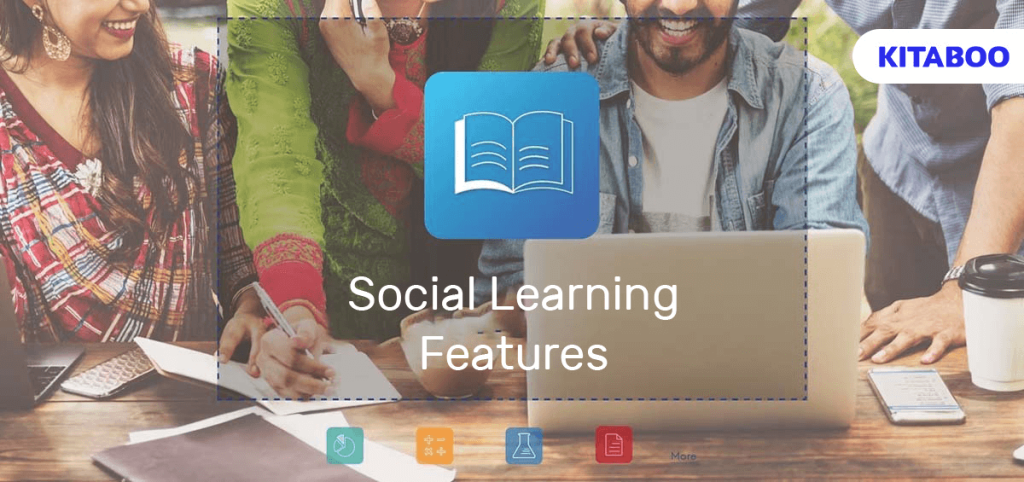
How Social Learning Features Can Revolutionize Online Education
The term “social learning” was first coined by Albert Bandura, a Canadian–American psychologist and professor of psychology at Stanford University. In his book titled “Social Learning Theory” released in 1977, he wrote, “Most human behavior is learned observationally through modeling: from observing others one forms an idea of how new behaviors are performed, and on later occasions, this coded information serves as a guide for action.”
His social learning theory focuses on four elements, which could be applied in the context of learning within organizations and institutions. These four elements include:
- Observational learning
- Reciprocal determinism
- Self-regulation
- Self-efficacy
Contemporary online learning models take inspiration from Bandura’s theory. Learning platforms manifest social learning through the design of social learning features, which nudge learners to observe, reciprocate, self-regulate, and nurture self-belief.
For instance, the cloud-based digital textbook platform KITABOO enables education providers to introduce social learning elements into eBooks and other content formats with ease.
Let’s understand the pillars and benefits of introducing social learning features into the learning experience.
Table of Contents
I. What are Social Learning Features?
II. 6 Social Learning Features
- Collaborative Learning
- Gamified Learning
- Peer-to-Peer/ Community Engagement
- AI-Powered Chatbots
- Social Media Integration
- Inviting User-Generated Content
III. 7 Benefits of Social Learning Features
- Enhances Collaborative/ Team Skills
- Builds Communication Skills
- Encourages Healthy Competition
- Keeps Learners Motivated
- Nurtures Healthy Competition
- Nurtures a Supportive Learning Environment
- Inculcates Creativity in Learners
IV. Conclusion
What are Social Learning Features?
Social learning features refer to a combination of elements that enable learners to engage with their peers seamlessly and effectively. Social learning aims to nudge learners toward collaborative learning, motivation, self-learning, observation, and retention of concepts.
Social learning is becoming more relevant, especially for online learners, who may experience isolation when learning by themselves. This engagement approach nurtures a spirit of community, competition, and collaboration, keeping learners motivated and investing in their learning journeys. It also helps foster healthy competition and prepares learners to join the workforce.
6 Social Learning Features
Social learning features add immense value to the learning experience. Here is a list of elements that education providers can imbibe into learning models with ease through a digital textbook platform like KITABOO.
Collaborative Learning
Social learning features that enable collaboration between peers and educators help foster the presence of a peer network and mentors. For instance, KITABOO enables education providers to design interactive ebooks.
Teachers can spotlight certain sections through the highlight feature and leave comments for students and vice versa. A social learning design also enables educators to walk learners through multimedia content pieces.
Gamified Learning
Introducing elements such as challenges, rewards, storylines, sound, and leaderboards enables learners to learn and build skills in context with other learners. For instance, the presence of a leaderboard nurtures healthy competition and gently motivates learners to push harder in their learning journeys.
Peer-to-Peer/ Community Engagement
Nurturing online communities helps learners network and build relationships with their peer learners. For instance, introducing community projects, group assignments, and online discussion threads can encourage learners to share knowledge and learn from each other.
AI-Powered Chatbots
Artificial intelligence-driven chatbots can engage with learners 24/7. They can be leveraged to support learners with information, direct them to relevant resources, and support students during challenging times.
Technologies such as Natural Language Processing (NLP) enable chatbots to recognize speech and offer timely, meaningful responses and engagement.
Social Media Integration
With social media becoming such an important part of daily consumer engagement, it’s unsurprising that this element has found its way into social learning. By enabling comments, likes, follows, and other popular social media engagement actions, learners can bring their social behavior to enhance and connect on learning platforms.
Inviting User-Generated Content
While education providers create tons of relevant content, learners can also be encouraged to create and share user-generated content such as essays, questions and answers, videos, and slideshows on their learning platform. Smart social learning design encourages learners to showcase their knowledge and creativity through content creation and promotion.
7 Benefits of Social Learning Features
Here is a snapshot of how social learning features drive engagement, skill-building, and learning effectiveness.
Enhances Collaborative/ Team Skills
Collaborative social learning features help foster team spirit among learners, which is the foundation for team skills in the workplace. Learners build soft skills in empathy, time management, problem-solving, leadership, crisis management, and critical thinking.
Nurtures Communication Skills
Communication is one of the most important soft skills professionals need to thrive at work. Social learning features enable learners to communicate consistently with peers, project mates, educators, and other learners in their circle of influence. They learn how to express themselves more effectively and drive results.
Builds Engagement
Adding social learning features makes the entire learning journey much more engaging for learners. It makes learning an interactive, two-way communication experience. Learners are far more motivated to spend time on learning platforms that reward and challenge them in the journey.
Nurtures Healthy Competition
Using leaderboards and challenges introduces the concept of competition, which is a fact of life in the real world. Learners are nudged to compete with peers. In the process, they enhance their skills and knowledge and bring excellence to their work.
Nurtures a Supportive Learning Environment
Nurturing safe, interactive online communities enables learners to thrive in a supportive learning environment. Learners can exchange knowledge, share best practices, and bring their expertise to the table. Exposure to mentors helps learners gain valuable non-academic insights for success.
Inculcates Creativity in Learners
Encouraging learners to showcase their knowledge, skills, and unique expertise through challenges and group activities encourages them to be creative and innovative thinkers. Education providers can leverage platforms like KITABOO to build social learning features that enable learners to create content and engage meaningfully around it with peers and educators.
Conclusion
Today, most EdTech companies and learning platforms are introducing social learning features to nurture an engaged, active learner base.
A study conducted with Gen Z learners indicated that 62% of respondents believed that social learning tools contributed to enhanced learning. 69% agreed that social learning tools also helped strengthen peer communication and collaboration.
Social learning tools will continue to play a growing role in enhancing engagement for and effectiveness for future generations of learners. Hence, education providers must consider investing early in social learning features across their delivery platforms.
Education publishers leverage state-of-the-art cloud-based digital textbook platforms like KITABOO to create, publish, distribute, and market interactive eBooks to their audiences worldwide.
To learn more, connect with us now!
To know more, write to us at contact@kitaboo.com.
Suggested Reads:
Discover how a mobile-first training platform can help your organization.
KITABOO is a cloud-based platform to create, deliver & track mobile-first interactive training content.



